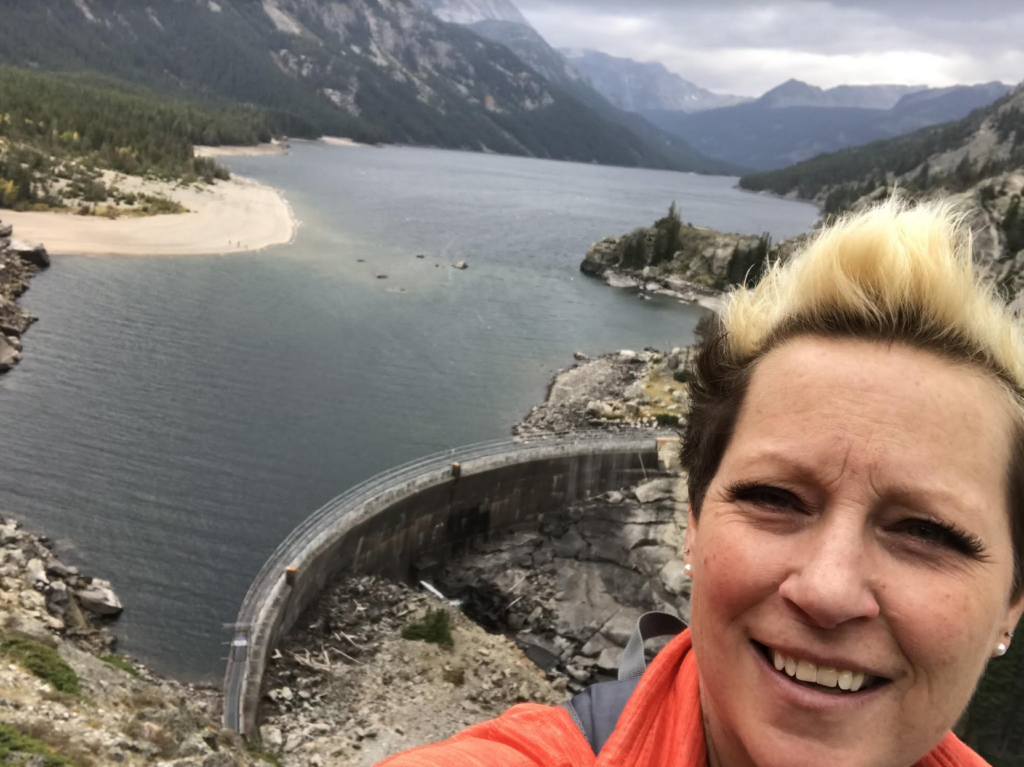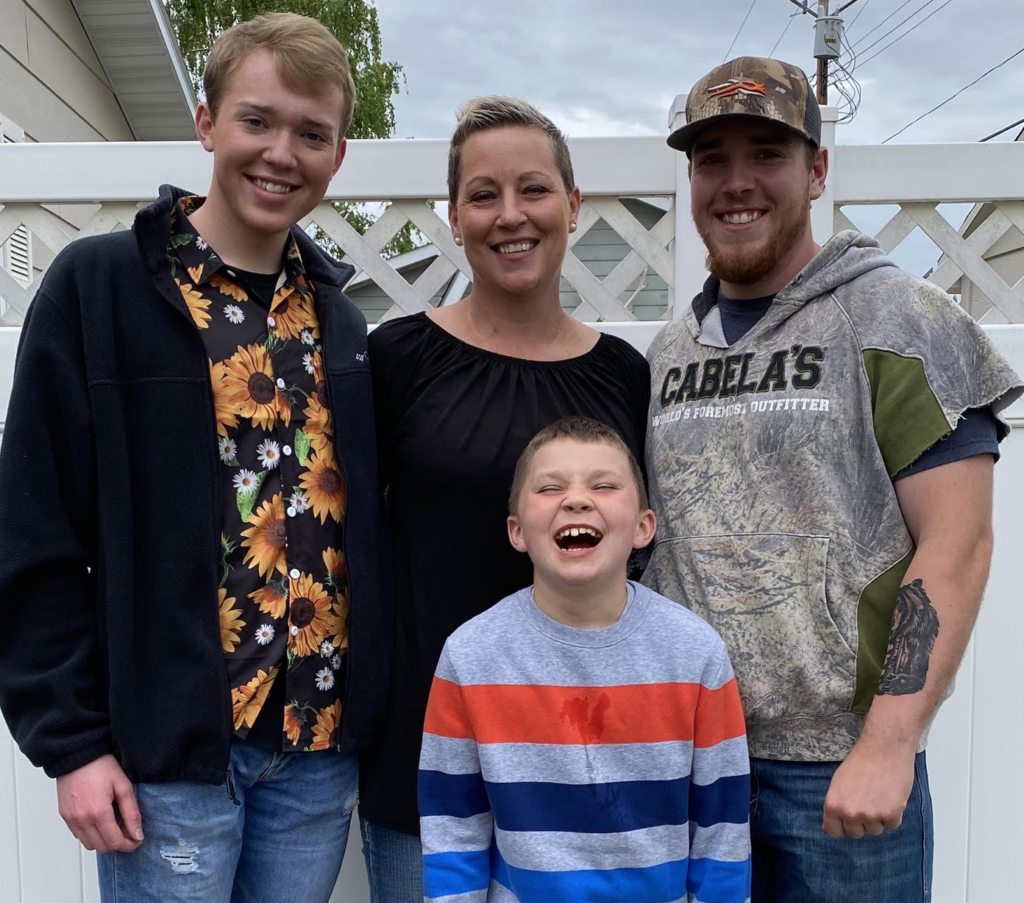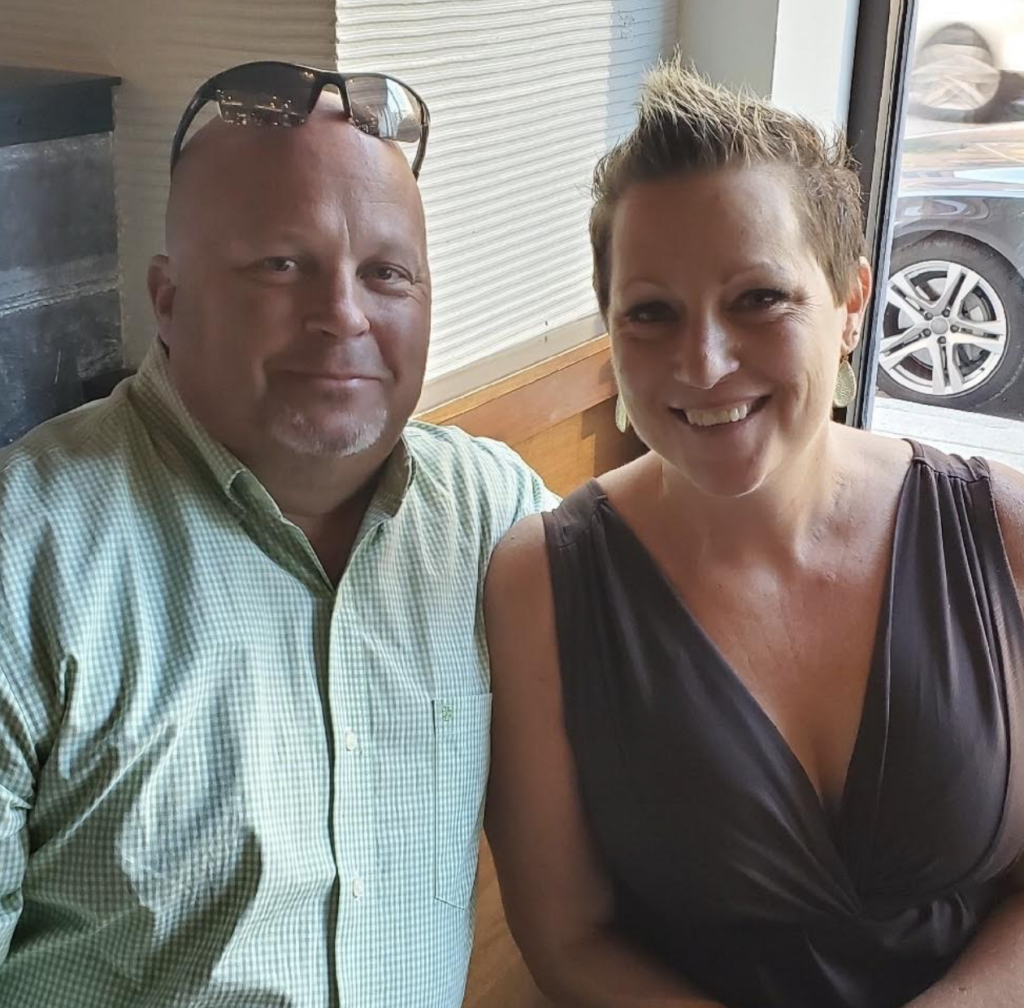As hard as it may be to hear, metastatic breast cancer can not be cured today. However, metastatic breast cancer can be treated, with a focus on extending and improving quality of life. The journey can be a roller coaster and today’s guest has learned how to endure the highs and lows with balance, grit, and a positive attitude. Here to share what she has learned throughout her breast cancer journey is Cinda Paynter.
About Cinda



Cinda Paynter, 48 yo, wife and mom of 3 boys (20, 18, 10). I work full time, love to be with my family and friends, be outside in my yard/garden, walks, and hikes. In the winter months I love being in front of the fire with the lights low and a cup of hot tea. My current cancer status: MBC; lymph nodes, bones and liver. * In 1986 I had Hodgkin’s Lymphoma Stage 3. I was in 8th grade. Brutal chemo! Remission while a freshman in high school. * 12-24-2014 Invasive Ductal Carsinoma Stage 1. Found by routine mammogram. The recommendation was lumpectomy and radiation. I quickly declined and said, we’re taking them both off. Easier said than done! My insurance company was only approving the removal of the one breast. I fought to have them both removed considering my Lymphoma history. Feb 2015 I had a double mastectomy/reconstruction. 2 additional reconstructions over a year’s time. Tamoxifen daily for several years. * April 2019, while snuggling with my youngest, his head hit the side of my left breast. I actually screamed in pain. The following day and weeks were a whirlwind. I saw my plastic surgeon thinking something was wrong with my implant. Nope, he referred me to get an ultra sound. I knew something was not ok. Things quickly moved to a Dr. appt, biopsy, Pet scan and diagnosis. Was Not expecting “You have Metastatic Breast Cancer, located primarily on your bones and liver and a few lymph nodes.” May 2 2019 port install, May 3, first round of chemo; Taxotere, Herceptin and Perjeta and then every 3 weeks. Chemo side effects; my hair fell out quickly, my finger and toe nails came off (thankfully not painful), eyes watering, extreme fatigue, heartburn, a little lymphedema, a little vertigo and neuropathy. Last chemo round was in Oct 2019, since then has been biotherapy; Herceptin and Perjeta every 3 weeks as well, monthly injections of Xgeva and Zoladex. Pet scans have been done every 3 months this whole time. Echocardiogram as well every 3 months as I have an anyerseum (not too concerning).
There is that and of course Everything in between! Ufta! Life, Family, Friends, Work.. In 2018 we found out my youngest has Batten Disease/CLN3. It is a rare and incurable neurological disease. He is currently blind and epileptic. I can wholeheartedly say 2019 and 2020 have been the BEST for me mentally, emotionally and spiritually. I am SO blessed!!!
Transcript
Adam (00:00):
As hard as it may be to hear, metastatic breast cancer cannot be cured today. However, metastatic breast cancer can be treated with a focus on extending and improving the quality of life. The journey can be a roller coaster and today’s guest has learned how to endure the highs and lows with balance grit and a positive attitude here to share what she has learned throughout her breast cancer journey is Cinda Paynter. Cinda, welcome to the show.
Cinda (00:27):
Thank you so much for having me
Adam (00:29):
Well, I’m so happy to get to talk to you. Let’s start just tell us a little bit about yourself and your breast cancer journey.
Cinda (00:37):
Okay. So, fortunately, maybe, unfortunately it’s journeys. And my journey started about 34 years ago with Hodgkin’s lymphoma and that was in eighth grade and went into remission my freshman year of high school chemo back then now reflecting back brutal the regimen of drugs that I was receiving. The word that I come up with is brutal. But God, through that went into remission and fast-forwarding. 2014 is by just routine mammogram found that I had invasive ductal carcinoma and I have always been on top of my womanly exams. And when I turned 40, it was like, okay, it’s time for my mammogram. And it just went from the mammogram to a biopsy to the diagnosis. That journey in itself seems like it had gone quickly, but really had I went in for what their recommendation was, was a lumpectomy and radiation. And I remember vividly sitting at with the radiologist and where the radiation would hit close to my heart. And I said, absolutely not. We’re not doing it. We’re taking them off. And so we went from there.
Adam (02:10):
Hmm. Wow. And so you, you’ve obviously navigated through a lot throughout your lifetime. I mean, walk us through, like, how do you navigate through the emotions that come with each diagnosis like that
Cinda (02:23):
The first diagnosis, you know, I’m a teenager. It just was, I don’t remember. Quite honestly, it was just something that had to be dealt with. And thankfully that journey in itself, it was, I had a lump in my neck and it was there and then it wasn’t there and gone to the doctor when it wasn’t there. And he said, you know, it’s probably just a cyst, maybe we’re sick. Maybe it was just in the large lymph node. And so my mom kind of thought, you know, we’re going to get that checked out again, went to the doctor, a different doctor. And he said, let’s do a biopsy, have the diagnosis of Hodgkin’s lymphoma, stage three, went to Mayo clinic second opinion, and then started chemo. And it just, I don’t remember anything other than doing chemo, going to school, playing in sports now, fast-forwarding again to I’m not, but five, six years ago I was, it was the mentality of, for me, just, okay, let’s do this.
Cinda (03:33):
And when they came up with that first recommendation and I said, no way, I just was reflecting back to that first diagnosis where, you know, all I could think of were lymph nodes and thinking, well, initially the insurance company was only going to allow the removal of one breast. And I’m like, that is that’s nonsense. I mean, I still have this one and maybe there would be a possibility I’m like, no. So it took about a month to work with insurance company. And I went in for a double mastectomy reconstruction and then had a couple more reconstructions after that. But I was not in a, an emotional, spiritual place that I am now. I still have that very hard-driven mentality of, okay, we’re going to get this taken care of, and this is what we’re going to do. And I have my family and my children to think about, and we just barreled through it and went on with life.
Cinda (04:45):
Now in 2019 on the third diagnosis, the past two years have been the most significant in my life with how we’ve gone through this. What’s been happening emotionally and primarily spiritually is, has been super significant. This third diagnosis was shocking. It still is very, very surreal in moments. It’s crazy. It’s, it’s been just a crazy, crazy ride. The emotions are daily for sure because it hacks my whole life and in every aspect. But first and foremost is my spirituality and my faith, that period with, with what’s and, and my, my safety nets and my family and my friends could not do this without.
Adam (05:42):
And it sounds like, you know, that, that faith, that safety net, that community really keeps you moving forward, right?
Cinda (05:50):
Percent. Absolutely. When this third diagnosis happened my mom and my sister were with me and was totally not expecting her to, just to say it out loud. It was like this fog. I was just like, I could, I remember it. But when she said, my oncologist said the words, it was just like this haze of what in the world are you even talking about? And, but it just went, boom, boom, boom. And a year and a half later here I am. And it’s, it’s amazing and crazy.
Adam (06:36):
And, and you’re, you’re currently living with, with MBC, right. And it seems like you’ve got a pretty positive attitude you’re driving forward. So I’d love to know, like what advice do you have to take the best care of yourself, both mentally and physically while living with MBC?
Cinda (06:53):
I can only say what’s worked for me and I’ve been blessed with maybe a certain personality of being very proactive. I am not afraid to ask any question and even the what ifs. And that can be really hard. Just recently. I asked my oncologist, I’ve got a pet scan coming up next week. And typically around that timing, I get a lot of high anxiety because it’s like, I’m going to know. Yep. You know, whether I, it came back. So I really have to find my happy place if you will, to settle myself down to get through that. But I had posed the question to her, okay, what are we going to do? What is, what is going to be, pardon me, our plan of attack, if that happens. And she said, you know, just in the past year, there’s been some new drugs that have come out for MBC and you know, it, it is it’s hopeful.
Cinda (08:00):
It is so hopeful. And to know that there are women out there living with MBC for years, years, and years, tens of years. And I just, that gives me even more drive to be there for my family. And, you know, I know that there’s a plan and path out there. I’m still here and I’ve put all of my trust in my people and my people are my oncologist and, and my cancer center people and the technicians. And I take that very personally, they are helping me get through all of this. So I, I’m not afraid to ask for help. And that did not come easy because I think that’s when I had the invasive ductal, I wasn’t asking for a lot of help. I was more like, I’m going to do this myself. And I’m going to get through this. And, you know, in the long run that had caused problems, but now I don’t know what, what exactly happened except for my, again, my spirituality and my faith. I was like, okay, you have me here for a reason. And I’m going to do my best and reach out to the people that love me and care about me and so far. So good.
Adam (09:31):
That’s great. That’s great. Well, it sounds like you’ve embraced the fact that this is a rollercoaster and you’ve found a way to live with balance. So can you talk just a little bit more about that? Why is it important to find balance?
Cinda (09:46):
Wow. life still goes on and I’ve chosen the road of myself and family. And with the hundreds of other things that happen in between all of that, I am, I’m taking a lot of pride in being able to be here. I get to be here. I’ve chosen to take a hold of that. You know, we still, I still have work and life and family, and, you know, we still have to make a mortgage payment and I still have to go to my infusions. And it seems like there’s with all those hundreds of things, I just have to tap in and I have to use my tools and my resources. And, you know, there are that roller coaster of high end, you know, most days I don’t have a lot to complain about when I do. And I get to a, a dark, sad, a key place. I allow myself some grace it’s okay to be sad and mad and angry because I do. And then I’m like, okay, you know, you, you have me here, let’s reel it back in, take a step back. And that is one thing too, that has been challenging is to step back and like, okay, I really have to take care of me. And because I have other people that depend on me. So it is, it is a constant balancing act for sure.
Adam (11:36):
Yeah. Wow. That’s fantastic. It’s good. Good advice. Good advice. So what advice would you give to our listeners or other people that are living with MBC? What, what’s one thing that you want them to know?
Cinda (11:47):
Take care of yourself and find that person or those people that can help you? Funny thing is, is I have never been one to want to be part of a group that that was not my comfort zone. However, it’s a, it’s a process. So allowing yourself some grace and that it is okay again, to, to feel those, maybe those negative feelings and to ask for help to know that you are loved, that you are cared for and you are a hundred percent not alone.
Adam (12:32):
That’s right. That’s right. Wow. That was great advice. Really great to meet you. I love your personality. Love your outlook. Thank you so much for joining me on the show today.
Cinda (12:40): Thank you so much, Adam.
Sponsors
This episode is sponsored by Amgen Oncology.

At Amgen, we are committed to the relentless pursuit of breakthroughs for cancer patients and their families. We have a deep and diverse pipeline of cutting-edge therapeutic approaches that aim to improve outcomes.
Amgen has been pursuing novel treatment approaches for more than 40 years.
We never stop looking toward the next frontier of innovation to bring the greatest potential benefit to patients.
